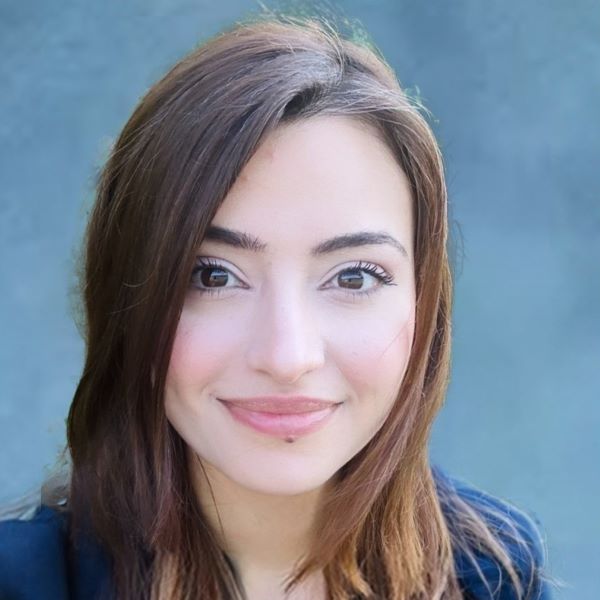Welcome to the national Student Academy of Audiology (SAA) Pathways to Audiology Interview Series! While many audiologists come from a Communication Science Disorders (CSD) background, others have taken different pathways to the field. In this series, the national SAA will interview both audiologists and AuD students who have or are taking non-traditional routes into the profession of audiology.
Our next interview is with Batoul Berri, AuD.

Q: Give us a brief description of yourself, your pronouns, your official title, where you are currently working, etc.
Batoul Berri, AuD. I’m a pediatric and vestibular audiologist at the University of Michigan–C.S. Mott Children’s Hospital, where I also serve as the coordinator of the Neurovestibular Research Lab.
Q: Where did you receive your bachelor’s and AuD (or PhD)?
I earned my AuD degree from Wayne State University and am currently a PhD candidate focusing on vestibular hearing science.
Q: What made you want to become an audiologist with a focus on pediatric vestibular sciences?
I’ve always been interested in the connection between hearing and balance, but what truly drew me to pediatric vestibular science was the opportunity to improve my patients’ quality of life through early diagnosis and intervention. As a pediatric audiologist, I witnessed firsthand how undiagnosed vestibular dysfunction affects motor development, coordination, and daily activities in children. There’s a clear need for more research and evidence-based care in this area. My passion lies in refining diagnostic protocols and ensuring children with hearing loss and/or vestibular dysfunction receive comprehensive care that supports both balance and auditory development.
Q: What does your day entail as a pediatric vestibular audiologist?
My schedule is split into three main domains each week: balance clinic, research, and pediatric audiology clinic. On vestibular days, I assess both adult and pediatric patients, adjusting protocols to suit the child’s age and developmental stage. My research day involves working on IRB-approved studies, including data collection and analysis. Pediatric clinic days focus on audiologic testing, hearing aid management, and electrophysiologic assessments. Throughout the week, I work closely with ENT specialists, neurologists, physical therapists, and speech therapists to provide a multidisciplinary approach to hearing and balance care.
Q: What classes or additional education would you suggest for students wanting to work in vestibular sciences?
I recommend foundational graduate-level courses in vestibular anatomy, physiology and assessment. Hands-on experience is just as important as coursework. Lab-based classes help develop a deeper understanding of vestibular testing techniques.If the course syllabus does not allow for this, the American Academy of Audiology offers several great learning labs with a vestibular focus. Additionally, shadowing a physical therapist specializing in vestibular rehabilitation is invaluable for understanding the impact of vestibular dysfunction on motor control and stability. Since vestibular audiology is highly collaborative, this exposure to rehabilitation strategies will help you become a well-rounded provider.
Q: What opportunities from your education helped solidify your interest pediatrics and vestibular?
The combination of clinical work and research with a collaborative team made me realize this field is both dynamic and incredibly rewarding. Rotations in pediatric audiology were especially impactful, exposing me to the challenges of adapting testing for younger patients and the need for a multidisciplinary approach in every aspect. Research into vestibular function deepened my understanding of how balance and auditory systems are interconnected.
Q: What kind of clinical placements would you suggest to a student wanting to go into pediatric vestibular?
In my opinion, the key to specializing in pediatric vestibular audiology is gaining experience in both pediatrics and vestibular testing, even if they come from different placements. Training in a pediatric audiology clinic helps build comfort with testing children and modifying protocols to suit their needs. Rotating through balance clinics that offer comprehensive vestibular testing, even if they primarily assess adults, is equally valuable. Understanding how each test works is crucial for adapting them for pediatric patients and prioritizing certain assessments appropriately. Additionally, shadowing at rehabilitation centers that provide vestibular physical therapy for children enhances counseling skills and provides insight into the rehabilitation process. Lastly, working in multidisciplinary clinics alongside ENTs, neurologists, physical therapists, and occupational therapists reinforces the team-based approach needed to manage pediatric vestibular disorders effectively.
Q: What do you know now that you wish you knew when you were deciding to go into pediatric vestibular?
It’s not as intimidating as it seems! Performing vestibular testing on pediatric patients is no different from any other audiologic assessment in this population—it just requires creativity, patience, and adaptability. Many traditional vestibular tests don’t translate well to children, so modifying approaches becomes essential. Additionally, there are several pediatric-friendly screening tests, that can provide valuable clinical insights. As vestibular audiologist, we’re used to completing a full test battery in one session. With kids, we need to prioritize certain tests, and we may not always get all the information at once – and that’s okay! Building a complete picture of their vestibular function can take up to two visits. Flexibility is key.
Q: Any final advice for students considering pediatric vestibular audiology or audiology in general?
Be patient and adaptable. Kids are just small adults who require different testing strategies and age-appropriate modifications. There’s still so much we don’t know about pediatric vestibular function—your work could help shape the future of the field! If you’re passionate about helping children, problem-solving, and blending science with patient care, pediatric vestibular audiology is an incredibly fulfilling career with endless opportunities to make a difference.
Related Posts
National SAA Board & Volunteer Opportunities–Your Next Big Step Starts Here
Thinking About Getting Involved? If you’ve ever thought, “I’d love to do more with national SAA, but…” — this is your sign to go for it. Whether you’re swamped with classes or unsure about stepping into leadership, you’re not alone. But here’s the truth: national SAA needs passionate, curious, and committed students like you to…
Lead with Intention: Networking, Wellness, and the Case for Self-Advocacy
Embracing topics such as networking, mental wellness, and self-advocacy are pivotal to setting yourself up for success as a student. While these topics can be scary, there are many resources out there to help you address any concerns you may have. And hopefully, the following tips will help you feel more confident in your own…
Helping Students Build Their Professional Network in Audiology
For many students, the word networking can feel intimidating—evoking images of awkward small talk and high-stakes conversations with seasoned professionals. As advisors, you play a pivotal role in demystifying this process and empowering students to build meaningful connections that can shape their careers. Early networking is essential for students seeking externships, job placements, and volunteer…




